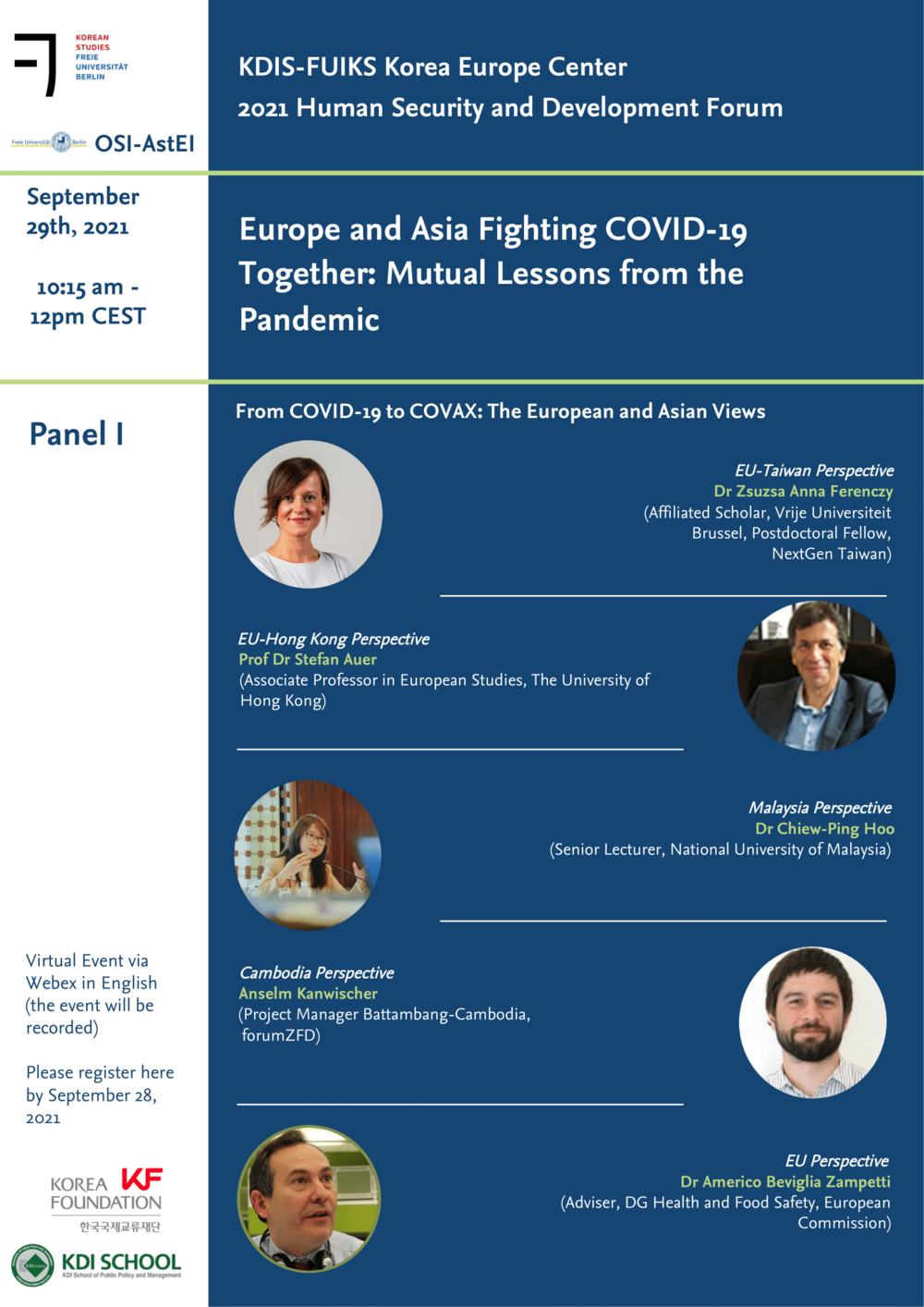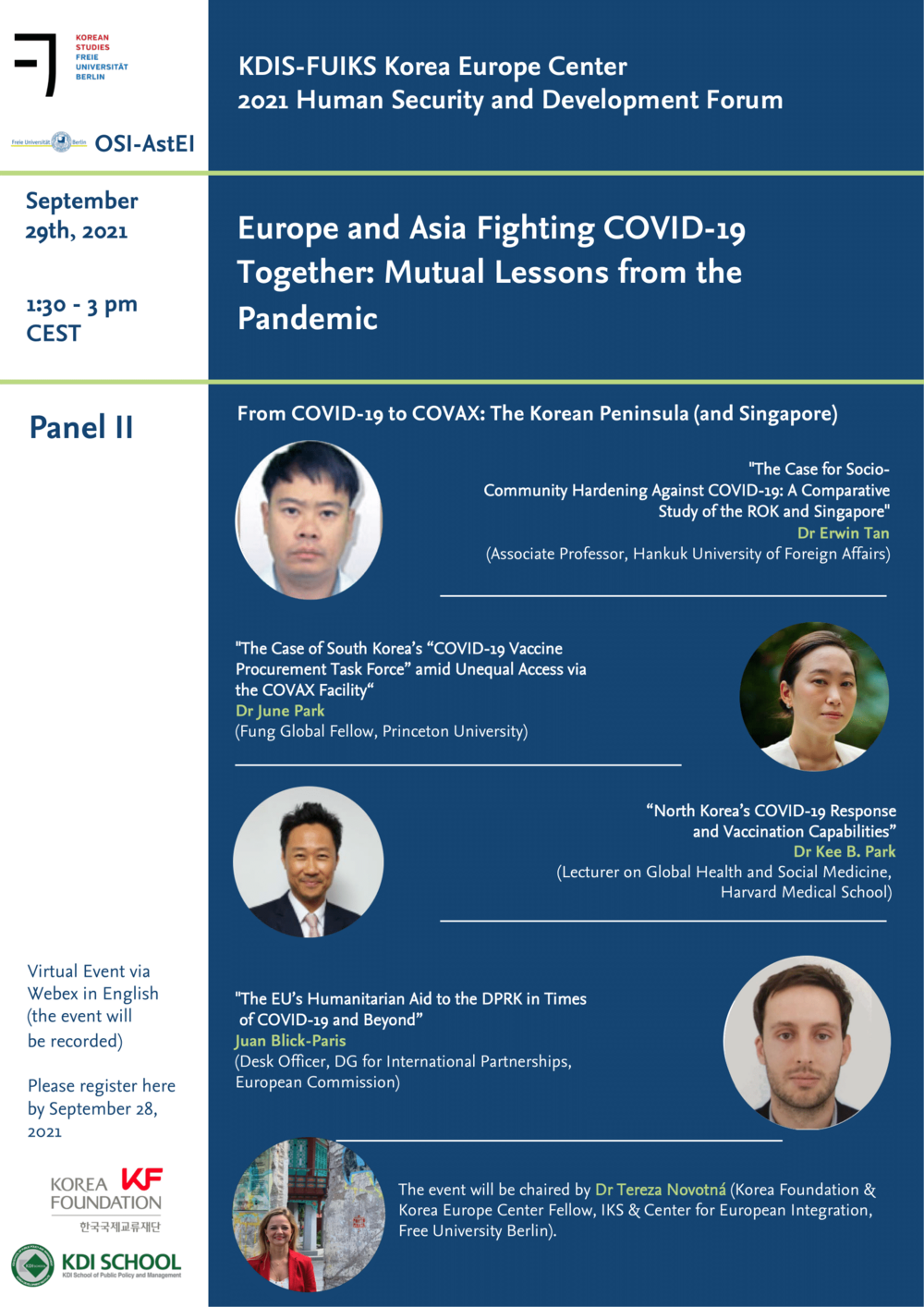Europe and Asia Fighting COVID-19 Together: Mutual Lessons from the Pandemic
Event Description
For over a year and a half, the world has been fighting the COVID-19 pandemic. While measures to manage the outbreak have ranged from strict lockdowns and closed borders up to the use of big data and artificial intelligence, on the whole, both North and South East Asia have fared generally better than Europe in terms of the number of cases, hospitalizations and fatalities. Yet now in the second phase when various vaccines have become available, many parts of Asia have been lagging behind Europe in their inoculation rates while new variants threaten to invade the countries where SARS-CoV-2 has virtually been non-existent.
How can we explain the stark differences between both regions, Europe and Asia, and what mutual lessons can we learn from one another? What can Europe do to help vaccinate the world, including developing countries and those with restricted humanitarian access? What is the role for organizations, such as the European Commission and COVAX, and what measures can be adopted so that any future pandemic is prevented and its impact mitigated?
Two panels of distinguished political scientists, economists, health experts and practitioners will debate mutual experiences in fighting COVID-19 from the European and Asian perspectives.
Program:
Welcome: 10:15 - 10:30 am (CEST)
Panel I: 10:30 am - 12:00 pm (CEST): "From COVID-19 to COVAX: The European and Asian Views"
The panel will compare the lessons from Taiwan, Hong Kong, Malaysia, Cambodia and Europe.
Speakers
Dr Zsuzsa Anna Ferenczy, Vrije Universiteit Brussel and Postdoctoral Fellow, NextGen Taiwan
Prof Dr Stefan Auer, Associate Professor in European Studies, The University of Hong Kong
Dr Chiew-Ping Hoo, Senior Lecturer, National University of Malaysia
Anselm Kanwischer, Project Manager Battambang-Cambodia, forumZFD
Dr Americo Beviglia Zampetti, Adviser, DG Health and Food Safety, European Commission
Panel II: 1:30 - 3:00 pm (CEST): "From COVID-19 to COVAX: The Korean Peninsula (and Singapore)"
The panel will examine the pandemic situation and its aftermath in South/North Korea and Singapore.
Speakers
Dr Erwin Tan, Associate Professor, Hankuk University of Foreign Studies
Dr June Park, Fung Global Fellow, Princeton University
Dr Kee B. Park, Lecturer on Global Health and Social Medicine, Harvard Medical School
Juan Blick-Paris, Desk officer, DG for International Partnerships, European Commission
The event will be chaired by Dr Tereza Novotná (Korea Foundation & Korea Europe Center Fellow, IKS & Center for European Integration, Freie Universität Berlin).
You can join on 29th September at 10:15 am (CEST) via: https://fu-berlin.webex.com/fu-berlin-en/j.php?MTID=m3c8fbe6bebb94ca6138d9f38d8ba9187
Speaker Biographies
Dr Zsuzsa Anna Ferenczy..
is Affiliated Scholar at the Department of Political Science of the Vrije Universiteit Brussel (Free University of Brussels) and Postdoctoral Fellow hosted by the Ministry of Science and Technology of Taiwan. She is also expert consultant on China, Taiwan and the Korean Peninsula of Human Rights Without Frontiers, Head of the Associate Network at 9DASHLINE, a fast-growing platform dedicated to offering analysis on issues affecting the Indo-Pacific, Research Fellow at Next Generation Foundation Taiwan.
Prof Dr Stefan Auer..
is Associate Professor at the University of Hong Kong. He was twice named Jean Monnet Chair in EU Studies (2010-2013 at La Trobe University in Melbourne and 2016-2020 in Hong Kong). He published an award-winning monograph, Liberal Nationalism in Central Europe (Routledge, 2004), and articles in e.g. Government and Opposition, International Affairs, The Journal of Common Market Studies and West European Politics. He is currently working on a book entitled European Disunion: Democracy, Sovereignty and the Politics of Emergency (Hurst, forthcoming 2022).
Dr Chiew-Ping Hoo..
is Senior Lecturer in the Strategic Studies and International Relations Program at the National University of Malaysia (UKM). She is concurrently co-founder and co-convener of the East Asia and International Relations (EAIR) Caucus at UKM. She was 2017 Shangri-la Dialogue’s Southeast Asian Young Leaders Programme (SEAYLP) Associate Research Fellow at the International Institute for Strategic Studies (IISS-Asia). Chiew-Ping was also Korea Foundation Field Research Fellow at Seoul National University in 2010, and Academy of Korean Studies (AKS) research fellow in 2011. Her main research interests include South Korean foreign policy, North Korean provocations, IR theory, and Korea-Southeast Asia relations. She is currently leading a Korea Foundation-funded project on Southeast Asia-North Korea relations, examining the security-economic linkages and strategic uncertainties of North Korean security challenges in the region. Dr. Hoo is consulted by Malaysian and international media on Korean security issues which appear in English and Mandarin mediums, including BBC News, Wall Street Journal, Washington Post, South China Morning Post, China Review, Sin Chew Daily, among others.
Anselm Kanwischer..
Anselm Kanwischer is a practitioner in the field of international cooperation and a member of different organisations and movements working in the area of peace building and human rights. Having worked in different scenarios on different continents he moved at the end of 2019 to live and work in Battambang, Cambodia where he observed and experienced the respective pandemic measures and impacts since the beginning of 2020 on the spot."
Dr Americo Beviglia Zampetti..
was educated at the University of Rome and The Johns Hopkins University, SAIS, where he studied international economics and international relations. He received his PhD in social sciences from the Katholieke Universiteit Leuven. In 1999-2000 he was Fulbright Research Scholar at the Harvard University Kennedy School of Government. His professional experience includes the Italian Trade Commission, the OECD, the European Commission, UNCTAD and the UN secretariat in New York. Between 2010 and 2015 he was Head of the Economic Section at the European Union Delegation to the United Nations in New York. He is currently adviser at the Directorate-General for Health and Food Safety of the European Commission.
Dr Erwin Tan..
holds the position of Associate Professor at the Graduate School of International and Area Studies in Hankuk University of Foreign Studies, Republic of Korea. His research interests include security dilemma theory, inter-Korean relations, security and diplomacy in the Indo-Pacific, and geostrategy. He also published ‘South Korea, Singapore and Taiwan Take on Coronavirus’ (from which several aspects of this presentation were derived), under the auspices of the Konrad Adenauer Stiftung and Digital Asia Hub; accessible at: https://medium.com/digital-asia-ii/south-korea-singapore-and-taiwan-take-on-coronavirus-7650a40bcde.
Dr June Park..
is a 2021-22 Fung Global Fellow of the Princeton Institute for International and Regional Studies at Princeton University. She is a political economist by training and works on trade, energy, and tech conflicts with a broader range of regional focuses not just on the U.S. and East Asia, but also Europe. She studies economic pressures and conflicts, analyzing different policy outcomes based on governance structures – domestic institutions, leaderships, and bureaucracies that shape the policy formation process. Her current work pertains to post-pandemic geoeconomic conflicts in data governance and technology.
Dr Kee B. Park..
obtained his medical degree from the Rutgers University in New Jersey and trained in neurosurgery at the Temple University Hospital in Philadelphia, Pennsylvania. He is the Director of the North Korea Program at the Korean American Medical Association and leads the collaboration between US and DPRK physicians. Dr. Park is a consultant for the World Health Organization and serves on the WHO Expert Advisory Panel on Surgical Care and Anesthesia. In this capacity, he advocates for and assists in the development of national surgical plans by the Member States. He is a diplomate of the American Board of Neurological Surgery, a member of the Advisory Committee for the Foundation of the World Federation of Neurosurgical Societies, member of the National Committee on North Korea, and member of Council of Korean Americans.
Juan Blick-Paris..
studied History at University College London and Oxford University in the UK, and at Ca’ Foscari University in Italy. His focus was on the fields of European political thought, international relations and post-colonial studies. He currently works at the European Commission’s Directorate-General for International Partnerships (DG INTPA), where he deals primarily with the implementation of the EU’s humanitarian aid programme in the DPRK, policy dialogue on development cooperation with the Republic of Korea, and inter-Korean issues.
Zeit & Ort
29.09.2021 | 10:15 c.t. - 15:00
Webex (online)
Weitere Informationen
Please register here by September 28, 2021:
https://fu-berlin.webex.com/fu-berlin-en/j.php?RGID=r44adf368879d9078a1869d756d0e3adb


